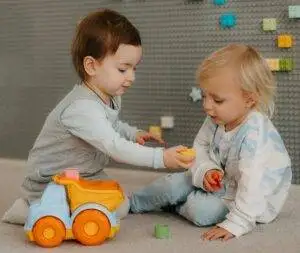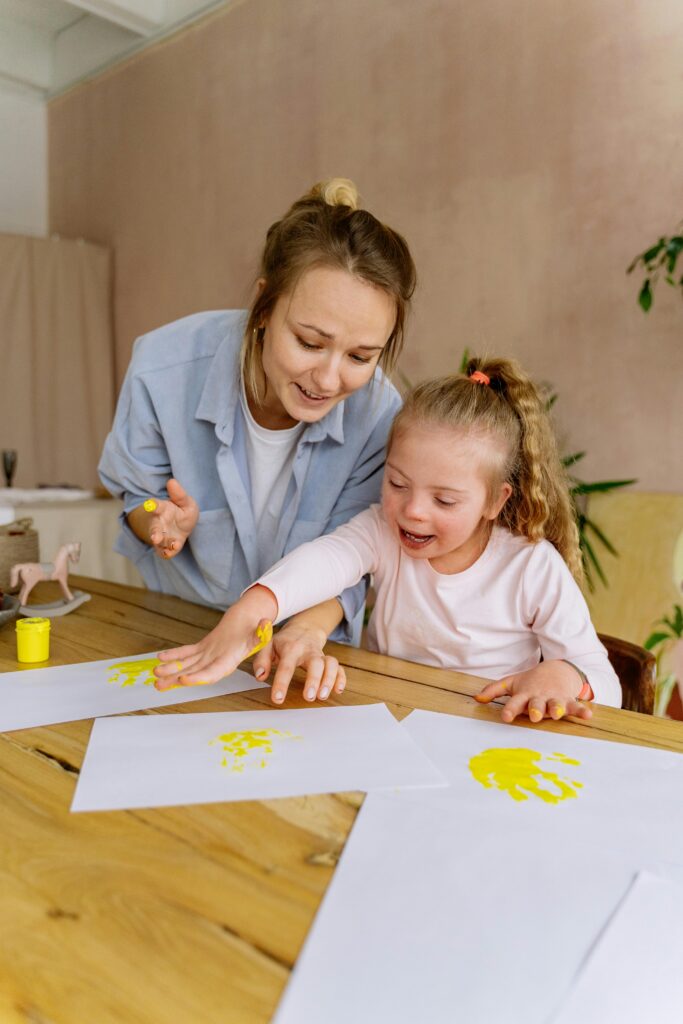Watching your child say their first words and start chatting is a magical part of growing up. As parents, you might wonder: When does my child start babbling? When do they learn to speak in sentences? This blog post will guide you through each speech and language milestone with clear, simple explanations. Let’s dive into this amazing journey together!
What Are Speech and Language Milestones? 🔎
Speech and language milestones are steps kids reach as they learn to talk and use language.
- Speech means the sounds we make—like “ba,” “ma,” and “pa.” These are the building blocks of words.
- Language is how we put sounds and words together to share ideas, thoughts, and feelings.
These milestones help parents and pediatricians know if a child is on track or needs extra help.
Why Speech and Language Milestones Matter

- Turning words into connections: Good language skills help kids talk with friends, ask questions, and communicate clearly.
- Growing brains and learning: Early language builds strong brain pathways for reading, writing, and thinking later on.
- Spotting early delays: If a child doesn’t meet milestones, getting help early can make a big difference. Pediatricians and speech therapists can provide the best support.
Speech and Language Milestones by Age
Below are the milestone breakdowns by age. Think of them as a roadmap—you don’t need to reach every point exactly on time, but they give useful insights.
Birth to 3 Months
- Cooing sounds: Babies make soft “ooh” or “aah” sounds when happy or sleepy.
- Recognize voices: They calm down or look at familiar voices.
- Smile or “coo” back when you talk or sing to them.
What you can do: Talk, sing, and read to your baby daily. Even simple sentences like “Good morning!” help their brain.
4 to 6 Months
- Babbling everyday: They make sounds like “ba-ba” or “ma-ma.”
- Pitch changes: Their voice goes up and down like they’re having a conversation.
- Turn-taking: Pause when you speak, then they “answer.”
What you can do: Repeat their sounds and respond with excitement—it encourages more babbling!
7 to 12 Months
- More babbling: They combine sounds like “da-da” or “ba-ma.”
- First word: Expect “mama,” “dada,” or simple words like “hi.”
- Pointing to communicate: They point at things they want.
What you can do: Describe everyday things: “That’s a red ball!” Ask questions like, “Do you want your teddy?”
1 to 2 Years
- 50+ words: By 2 years, kids often know many words.
- Two-word phrases: They say “more juice” and “go park.”
- Follow simple directions: They can obey instructions like “Get your shoes.”
What you can do: Encourage more words: “Say ‘hi’ to Teddy.” Read picture books, name objects, and ask questions like, “What color is this?”
2 to 3 Years
- 200+ words: Vocabulary grows fast!
- Three-word sentences: “I want cookie.”
- Simple questions: They ask, “What’s that?” and “Where’s dog?”
What you can do: Ask them to tell you more: “Where is the cat?” “Who’s that?” Use complete sentences with good grammar to model speech.
3 to 4 Years
- Longer sentences: 4+ words (“I want big truck.”)
- Storytelling: They talk about what happened at preschool.
- Understand “why” questions: They respond to “Why is the kitty sleeping?”
What you can do: Play pretend games, share stories, and let your child “talk” for a few minutes every day.
4 to 5 Years
- Full sentences: Kids speak clearly with good grammar.
- Tell full stories: They talk about the past, present, and future.
- Use “if,” “because”: For example, “If I eat, I will be full.”
What you can do: Ask them to retell a favorite story or day. Encourage conversations about feelings and ideas.
What If My Child Is Behind? Signs to Watch
Not all kids develop at the same pace, but these are warnings you shouldn’t ignore:
- By 18 months: They aren’t using about 15 words or pointing or “saying” things.
- By 2 years: Few words, or they don’t use two-word phrases.
- By 3 years: Trouble being understood or not speaking in sentences.
- By 4–5 years: Still hard to understand or random “jargon” speech.
If you’re concerned, talk to your pediatrician or a speech-language pathologist. The earlier the support, the better!
How to Support Speech Development at Home
1. Talk Often
Hello, good morning, what are you wearing? Describe your day. This provides your child with numerous words and demonstrates how language functions.
2. Read Every Day
Pick colorful picture books. Name objects, point to pictures, and ask, “What’s this?” Reading helps with word learning.
3. Listen and Respond
When your child speaks—even babbles or gestures—you respond warmly. This encourages more communication.
4. Sing and Rhyme
Songs like “Twinkle, Twinkle” or “Humpty Dumpty” teach sounds and patterns. These are fun and help with speech rhythm.
5. Play Pretend
Playing with toys and talking aloud lets kids use language imaginatively. Try stuffed animal tea parties or dolls’ picnics.
6. Encourage Social Time
Playgroups, story hours, or preschool let kids hear and use language with others.
Professional Help: When and Why
If your child isn’t meeting speech milestones, these professionals can help:
- Pediatrician: First to check hearing, development.
- Audiologist: Tests hearing—key for speech learning.
- Speech-Language Pathologist: Assesses speech, builds personalized plans.
- Early intervention programs: For kids under age 3—often government-funded.
Remember, kids thrive when help starts early!
Building on Early Speech—The Years Ahead
5–7 Years
- Clear full sentences—nearly all family members understand them clearly.
- More books, more words: Reading boosts grammar and vocabulary.
7–9 Years
- Complex storytelling, understanding jokes, and riddles.
- School success: Reading, writing, and improving expression.
Noticing any slowdowns in this stage? Talk to a reading specialist or speech therapist.
Real-Life Example: Timmy’s Story
Timmy, now 4, said only a few words at age 2. His parents noticed he didn’t point or babble much. At 2½, they visited a speech therapist.
- Therapy started: Focus on early sounds and words.
- Home practice: They followed a fun plan—talking and reading daily.
- By age 3: He had 200+ words and spoke in sentences.
Timmy’s parents say:
“We were so worried, but after therapy, he started chatting all day. I used to worry, but now he tells me about his day at preschool!”
This shows how early support can be amazing!
FAQs: Quick Answers for Busy Parents
Q: Does watching TV help speech?
A: Not much. Real conversation is best. If you use screen time, watch with them, and talk about what’s on screen.
Q: My child speaks two languages. Will that slow development?
A: No, it’s normal to develop speech milestones a bit later. Bilingual kids are smart and often catch up quickly!
Q: What if my baby screams or cries a lot?
A: That’s okay early on—babies express before they speak. Talk and sing to them to help build speech.
Celebrate Every Word

Watching your child hit each speech and language milestone is exciting. The best gifts you can give? Everyday conversations, cuddle-up story times, silly songs, and lots of love. Talk to your pediatrician when in doubt—and remember, every family is unique—and each child learns in their own time.
By tracking milestones and giving support early, you’re helping your child build a strong foundation for school, friendships, and the world. You’ve got this!
Connecting to More Trusted Parenting Advice
Need more ideas on parenting your toddler? Here are two great blog posts from Omega Pediatrics



